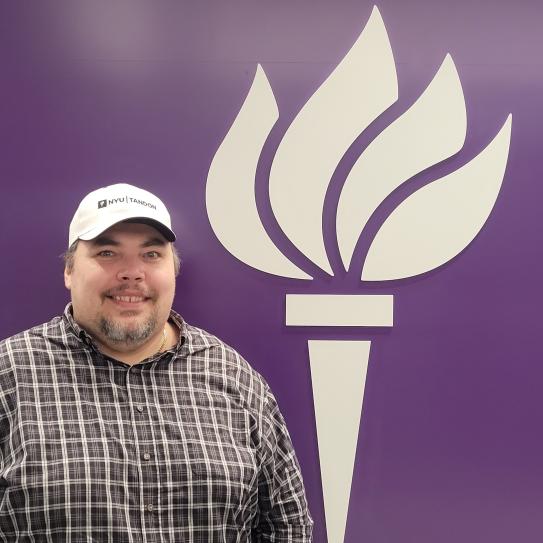
Danny Feygin has worn multiple hats at NYU Tandon. Student, alumnus, staff member ... maybe after more than a quarter-century, the most accurate description of him would be member of the university family.
Feygin — who came to the U.S. from Ukraine at the age of 13 and honed his English skills by watching 1990s-era sitcoms like Saved by the Bell and Full House — was not immediately drawn to STEM topics. He dreamt instead of a literary career: perhaps one day he’d write a novel or some other teenager would come to America and learn English by watching a television show he had scripted.
It was only after a high school guidance counselor noted his analytical mind and suggested applying to engineering schools that he seriously considered pursuing that path. And when NYU Tandon, then still known as Polytechnic University, offered a generous scholarship, he made his decision.
It seemed like a fortuitous one: Feygin was able to leverage his analytical skills and interest in writing thanks to a program in technical and professional communications, and he found a willing mentor in Jean Gallagher, an award-winning poet and writing instructor who later went on to co-chair Tandon’s Department of Technology, Culture, and Society. An avid drummer, he helped form a student band, known as The PolyPhonics, who played at intercollegiate basketball and volleyball games, and he even met his wife, Magda, who later studied organizational behavior at the School of Engineering, here. (The two were introduced by George Stumpf II, the PolyPhonics guitarist, and married in 2009; they had a son, Benjamin, in 2010; and she earned her own degree in 2013.)
But while that guidance counselor may have made a helpful suggestion, her timing could have been better. Feygin was in the midst of earning his undergraduate degree when the dot-com bubble — a heady period for tech startups — burst, leaving several failed companies in its wake and prospects for new graduates looking somewhat dim. By the time he graduated in 2002, the terrorist attacks of 9/11 had made the global outlook even bleaker.
Feygin had worked as a student in the school’s office of Information Systems, and his supervisors suggested that after graduation he simply stay on. A few months later, when a post opened in Poly’s development office, he made the move there, and in 2013, as the merger between NYU and Poly neared fruition, Feygin (who had used the ensuing years to earn his master’s degree while working full time) joined the University Development and Alumni Relations office on Washington Square. There, he now serves as an assistant director of prospect research, helping fellow alumni find ways to engage with their alma mater. That means, for example, if he learns of an alum who has gained deep expertise in construction, he can suggest they return to Brooklyn to mentor a civil engineering student or give a guest presentation.
Ideally, he’d like all alumni to feel, as he does, like members of the NYU family.

